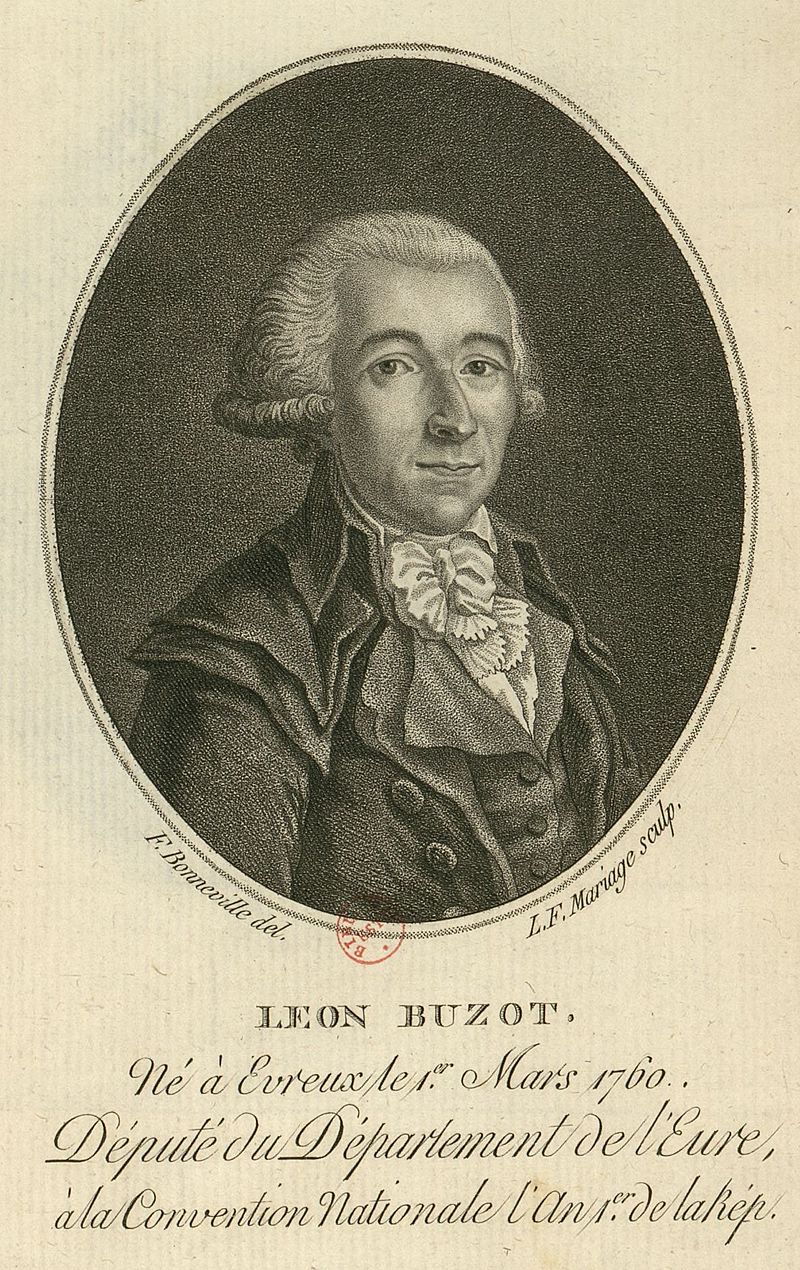<Back to Index>
- Politician François Nicolas Léonard Buzot, 1760
- Merchant and Politician Jean - François Ducos, 1765
PAGE SPONSOR

François Nicolas Léonard Buzot (1 March 1760 - 24 June 1794) was a French politician and leader of the French Revolution.
Born at Évreux, Eure, he studied Law, and, at the outbreak of the Revolution was a lawyer in his home town. In 1789 he was elected deputy to the Estates - General and there became known for his radical opinions. He demanded the nationalization of the possessions of the Roman Catholic Church, and the right of all citizens to bear arms.
After the dissolution of the National Constituent
Assembly, Buzot returned to Évreux, where he was named
president of the criminal tribunal.
In 1792 he was elected deputy to the National Convention, and joined the Girondists under the influence of his friend Madame Roland. Buzot entered a polemic with the main rival of the Girondists, Jean - Paul Marat, and demanded the formation of a National Guard from the départements to defend the Convention against the Paris crowds of sans - culottes. His proposal was carried, but never put into force - the Parisians subsequently singled him out as a target of their hatred.
In the trial of King Louis XVI, Buzot voted in favor of
the capital punishment, but with appeal to the people and
postponement of sentence (sursis). He had a
sentence of death passed against the Royalist émigrés
who did not return to France, and against anyone who
should demand the re-establishment of the monarchy. At the
same time, he opposed Georges Danton and The Mountain, and
rejected the creation of a Committee of Public Safety and
Revolutionary Tribunal (but abstained when the question of
Marat's trial before the Tribunal was brought up by the
Girondists).
Proscribed with the Girondists on 2 June 1793, he escaped, and took refuge to Calvados in Normandy, where he contributed to organize a Girondist insurrection against the Convention, which was suppressed soon after.
The Convention prosecuted him, and decreed "that the house occupied by Buzot be demolished, and never to be rebuilt on this plot. [Instead,] a column shall be raised, on which there shall be written: «Here was the sanctuary of the villain Buzot who, while a representative of the people, conspired for the overthrow of the French Republic»". He fled together with Jérôme Pétion de Villeneuve to Saint - Émilion, near Bordeaux, and remained in hiding. Both of them committed suicide in the forest surrounding the area; their bodies were recovered a month later, half eaten by wolves.
He left behind his Memoirs, first published in
1823.
Jean-François Ducos (26 October 1765, Bordeaux - 31 October 1793) was a French député for the Gironde to the Legislative Assembly then the National Convention.
The son of a merchant in Bordeaux, he was sent to Nantes to learn his trade but there became interested in politics and philosophy, joining several such circles, in which he gained a reputation for patriotism. This allowed him to be elected as a député for Gironde to the Legislative Assembly then the Convention. There he sat with the Girondins (but tended to favor the opinions of the Montagnards) and took up marked positions, such as in the issues surrounding Louis XVI, the abolition of the monarchy and the question of the refractory priests. He was virulently opposed to La Fayette.
Protection from Marat meant he escaped a purge on 2 June 1793, but he fell under suspicion due to his protests against the arrests and summary 'disappearances'. He was mentioned in the report by Amar on 3 October 1793 and condemned to death on 30 October. He was guillotined on 31 October alongside other Girondins, including his friend and brother - in - law Jean - Baptiste Boyer - Fonfrède. Noted for his caustic wit, Ducos reputedly remarked, while awaiting his turn at the guillotine, "The Convention has forgotten one thing: a decree on the unity and indivisibility of heads and bodies."